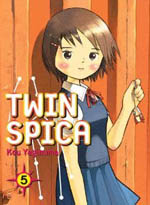 By Kou Yaginuma
By Kou Yaginuma
208 pages, black and white
Published by Vertical, Inc.
Since Vertical launched their English editions of Twin Spica last year, it’s been fun to receive a new installment every two months and watch the story unfold—in no small part because Kou Yaginuma has quietly been tweaking the story since those early chapters, adding and discarding elements as he sees fit. By this fifth volume, it’s juggling two related but tonally different storylines, one involving training for Japan’s astronaut program and a second one about memories of young love. The latter is aided by the ghost of "Mr. Lion," whom Yaginuma seems to be trying to keep relevant to the story by showing his past with Asumi’s classmate Marika. If we didn’t already have the storyline involving Marika’s health issues, this might have seemed more out of the blue, but instead it serves a purpose by giving us more information about this secretive character.
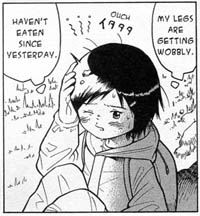 Still, the primary draw for me remains the training for space, and after meandering away from it for a while, the second half of the book is taken up primarily by a training exercise that the entire class goes on. It’s actually one of my favorite parts of the series to date, with what seems like a simple simulation suddenly turning into a much more challenging event. Child-sized Asumi is our main focus here, and I appreciate the fact that Yaginuma is able to cast doubt into the reader’s mind on if she’s really cut out to be an astronaut. Considering she’s our main character, the fact he can plant that doubt is a good one. His delicate art style assists in that manner; watching the battered Asumi stumble through the challenge wouldn’t be half as effective if she seemed buff and sturdy. With its twin love affairs of childhood romance and the yearning for space, Twin Spica continues to draw its readers in, and is worthy of staying on your radar. If you ever wanted to be an astronaut, you’ve got to read this series.
Still, the primary draw for me remains the training for space, and after meandering away from it for a while, the second half of the book is taken up primarily by a training exercise that the entire class goes on. It’s actually one of my favorite parts of the series to date, with what seems like a simple simulation suddenly turning into a much more challenging event. Child-sized Asumi is our main focus here, and I appreciate the fact that Yaginuma is able to cast doubt into the reader’s mind on if she’s really cut out to be an astronaut. Considering she’s our main character, the fact he can plant that doubt is a good one. His delicate art style assists in that manner; watching the battered Asumi stumble through the challenge wouldn’t be half as effective if she seemed buff and sturdy. With its twin love affairs of childhood romance and the yearning for space, Twin Spica continues to draw its readers in, and is worthy of staying on your radar. If you ever wanted to be an astronaut, you’ve got to read this series.
Purchase Links: Amazon.com | Powell’s Books
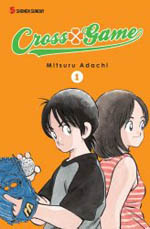 By Mitsuru Adachi
By Mitsuru Adachi
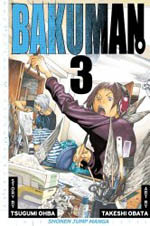 Written by Tsugumi Ohba
Written by Tsugumi Ohba By Kou Yaginuma
By Kou Yaginuma Still, the primary draw for me remains the training for space, and after meandering away from it for a while, the second half of the book is taken up primarily by a training exercise that the entire class goes on. It’s actually one of my favorite parts of the series to date, with what seems like a simple simulation suddenly turning into a much more challenging event. Child-sized Asumi is our main focus here, and I appreciate the fact that Yaginuma is able to cast doubt into the reader’s mind on if she’s really cut out to be an astronaut. Considering she’s our main character, the fact he can plant that doubt is a good one. His delicate art style assists in that manner; watching the battered Asumi stumble through the challenge wouldn’t be half as effective if she seemed buff and sturdy. With its twin love affairs of childhood romance and the yearning for space, Twin Spica continues to draw its readers in, and is worthy of staying on your radar. If you ever wanted to be an astronaut, you’ve got to read this series.
Still, the primary draw for me remains the training for space, and after meandering away from it for a while, the second half of the book is taken up primarily by a training exercise that the entire class goes on. It’s actually one of my favorite parts of the series to date, with what seems like a simple simulation suddenly turning into a much more challenging event. Child-sized Asumi is our main focus here, and I appreciate the fact that Yaginuma is able to cast doubt into the reader’s mind on if she’s really cut out to be an astronaut. Considering she’s our main character, the fact he can plant that doubt is a good one. His delicate art style assists in that manner; watching the battered Asumi stumble through the challenge wouldn’t be half as effective if she seemed buff and sturdy. With its twin love affairs of childhood romance and the yearning for space, Twin Spica continues to draw its readers in, and is worthy of staying on your radar. If you ever wanted to be an astronaut, you’ve got to read this series.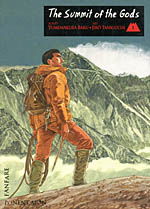 Based on a book by Baku Yumemakura
Based on a book by Baku Yumemakura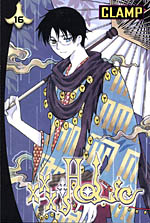 By CLAMP
By CLAMP Edited by Sean Michael Wilson
Edited by Sean Michael Wilson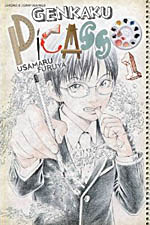 By Usamaru Furuya
By Usamaru Furuya By Guillaume Bouzard, Byun Ki-Hyun, Catel, Chaemin, Choi Kyu-Sok, Igort, Lee Doo-Ho, Lee Hee-Jae, Park Heung-Yong, Mathieu Sapin, Hervé Tanquerelle, and Vanyda
By Guillaume Bouzard, Byun Ki-Hyun, Catel, Chaemin, Choi Kyu-Sok, Igort, Lee Doo-Ho, Lee Hee-Jae, Park Heung-Yong, Mathieu Sapin, Hervé Tanquerelle, and Vanyda By CLAMP
By CLAMP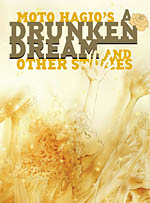 By Moto Hagio
By Moto Hagio